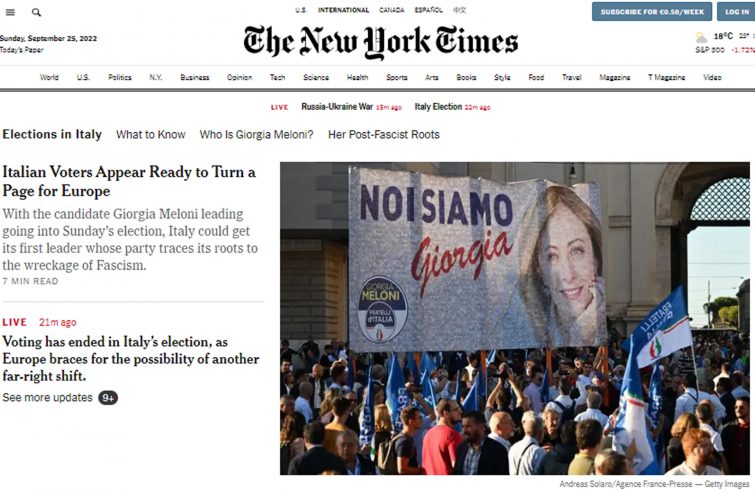
(from New York) In the weeks leading up to Sunday’s elections, Italy has been under close scrutiny. The United States followed the rise of right-wing party ‘Brothers of Italy’ (Fratelli d’Italia) and its leader, Giorgia Meloni, with special attention owing to the origins of the political formation, and because of concerns linked to the implications of a populist shift affecting the Atlantic Alliance and the Biden administration. US Secretary of State Antony Blinken was the first to break the ice after election results were confirmed on Monday, when he tweeted: “We are eager to work with Italy’s government on our shared goals.” He reiterated that “Italy is a vital ally, strong democracy, and valued partner.” Yesterday afternoon, the White House press secretary clearly stated: “we will work with the new Italian government on shared global challenges, including support for Ukraine” reiterating that “Italy is a NATO ally, a G7 partner; and a member of the EU.” But Giorgia Meloni’s Brothers of Italy party did not triumph among Italians living in the United States, where the Democratic Party (PD) won the three seats up for grabs in the North American constituency.
In an article on the leader of Fratelli d’Italia, Catholic newspaper ‘Crux’ highlights her strong “Roman accent” and the fact that she identifies herself as a “conservative Catholic.” “She is an unmarried mother with a partner and a son. She firmly believes that marriage is between a man and a woman and challenges further progress in legislation concerning LGBT persons”, reads the article, with a few lines devoted to her “coalition partner Salvini, who describes himself as a Catholic who strongly disagrees, however, with Pope Francis’ position on immigration.” Crux quotes Pope Francis and his condemnation of populism, recalling his appeal to Italy and Europe “not to be misled by self-proclaimed saviours”.
“As the country’s first far-right prime minister, Meloni rejects any connection to fascism, but her party retains many of the symbols and values of Italy’s fascist past, note commentators in the United States. Small wonder, then, that the prospect of her gaining power has spooked markets and international observers alike”, writes ‘Foreign affairs’, pointing out that Meloni will need to “bolster her international credibility”, and that the long-term viability of her government “will depend on whether markets accept her leadership.”
For the New York Times “the greatest concern is not that Giorgia Meloni’s party is poised to restore fascism in Italy, whatever that means, but that a government led by her, if steadfast on certain principles, could turn Italy into an ‘electoral autocracy’ much along the lines of Viktor Orban’s Hungary.”
However, news analysis service ‘Politico’ warns against falling for the trap of “reducing the leader of ‘Fratelli d’Italia’ to simple labels like the Italian Donald Trump or Viktor Orbán or Marine Le Pen.” Instead, ‘Politico’ notes that “right-wing populism is getting smarter”, and it could inspire the agenda of many Republicans not subjugated by former President Trump. “Her combination of nationalist identity politics and transatlantic solidarity makes her a hit with American conservatives and makes her harder to isolate or dismiss,” reads the news outlet, adding that “Meloni is nationalism’s great hope, offering something leaders in Poland and Hungary cannot — leadership of a G-7 and G-20 country.”
“In fact, it would be a stretch to consider Ms Meloni, Italy’s first female premier, as a fascist”, writes the Washington Post in its editorial, which points out that that the ‘Brothers of Italy’ leader “has dropped her admiration for Putin” and has been unstinting in backing NATO’s support for Ukraine – although the same cannot be said of her probable coalition partners in Italy’s legislature.”
The subject of Italy’s first female prime minister is echoed in ‘The Atlantic’ magazine, which quotes Hillary Clinton’s interview at the International Venice Film Festival, when she said: “The election of the first woman prime minister in a country always represents a break with the past, and that is certainly a good thing.” However, the liberal magazine also mentions the less quoted part of that interview, where she remarked on how right-wing parties can sometimes appear better at promoting women. Women like Meloni “are protected by patriarchy,” she said, “because they are often the first to support the fundamental pillars of male power and privilege.” Meloni’s party slogan—“God, Fatherland, Family”—celebrates those very pillars of power. And it came from Mussolini’s dictatorship.”
For the Wall Street Journal, Italians are eager for change and have appointed a yet ‘untested’ leader to run the country. For New York’s financial newspaper, ‘the one crucial difference is that Meloni’s coalition could be made up of conservatives who are finally allowed to lead the government, and that could be the real lesson of this election.”










